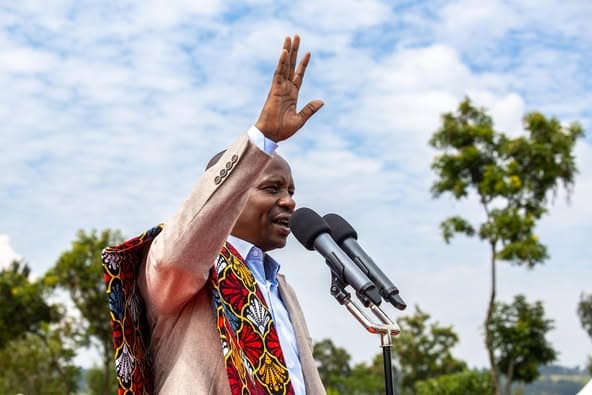We're loading the full news article for you. This includes the article content, images, author information, and related articles.
Deputy President Kithure Kindiki has asserted the Kenya Kwanza government's confidence in securing victory against the opposition in the 2027 general election, setting an early tone for political discourse.

Deputy President Kithure Kindiki has issued a stern warning to critics of the Kenya Kwanza government, predicting a decisive defeat for the opposition in the upcoming 2027 general election. Speaking at an empowerment forum in Kangame, Murang'a County, on Friday, October 3, 2025, Kindiki expressed strong confidence in the incumbent administration's ability to triumph over its rivals.
“Wakati wa siasa itakuja msituharakishe. Siku ya siasa inakuja na wale wanajiita mashujaa watakutana na fire. Hawawezani na sisi, Hao ni watu wadogo sana. Hawatuhjui vizuri, saa hii sasa wanatuongelesha kama wametoka mbinguni,” Kindiki stated in Swahili, which translates to: “The time for politics will come, do not rush us. The day for politics is coming and those who call themselves heroes will meet fire. They cannot match us, they are very small people. They do not know us well, right now they are talking to us as if they came from heaven.”
Kindiki's remarks signal an early commencement of political posturing ahead of the next general election, more than two years away. Such pronouncements are common in Kenyan politics, often used to rally support bases and project an image of strength. The Deputy President's confidence underscores the Kenya Kwanza alliance's strategic focus on consolidating its political standing and countering dissenting voices.
Political analysts suggest that these early declarations could significantly influence near-term public debate and the execution of government policies. Stakeholders are urging for clarity on timelines, costs, and safeguards related to governance, rather than an immediate shift to campaign rhetoric. The focus on future electoral contests so far in advance may divert attention from current development agendas and policy implementation.
The early onset of campaign rhetoric carries several risks. It could potentially polarise the political landscape prematurely, hindering bipartisan cooperation on critical national issues. Additionally, an extended campaign period might strain national resources and shift focus from essential service delivery to political mobilisation. There is also the risk of increased political temperatures, which could impact investor confidence and overall economic stability.
Observers will be keenly watching how the opposition responds to Kindiki's challenge and whether this marks a definitive start to early campaigns. The nature of political discourse in the coming months, particularly concerning policy debates versus electoral promises, will be a key indicator of the political climate. Furthermore, the government's ability to balance its development agenda with political messaging will be crucial.
Keep the conversation in one place—threads here stay linked to the story and in the forums.
Sign in to start a discussion
Start a conversation about this story and keep it linked here.
Other hot threads
E-sports and Gaming Community in Kenya
Active 9 months ago
The Role of Technology in Modern Agriculture (AgriTech)
Active 9 months ago
Popular Recreational Activities Across Counties
Active 9 months ago
Investing in Youth Sports Development Programs
Active 9 months ago